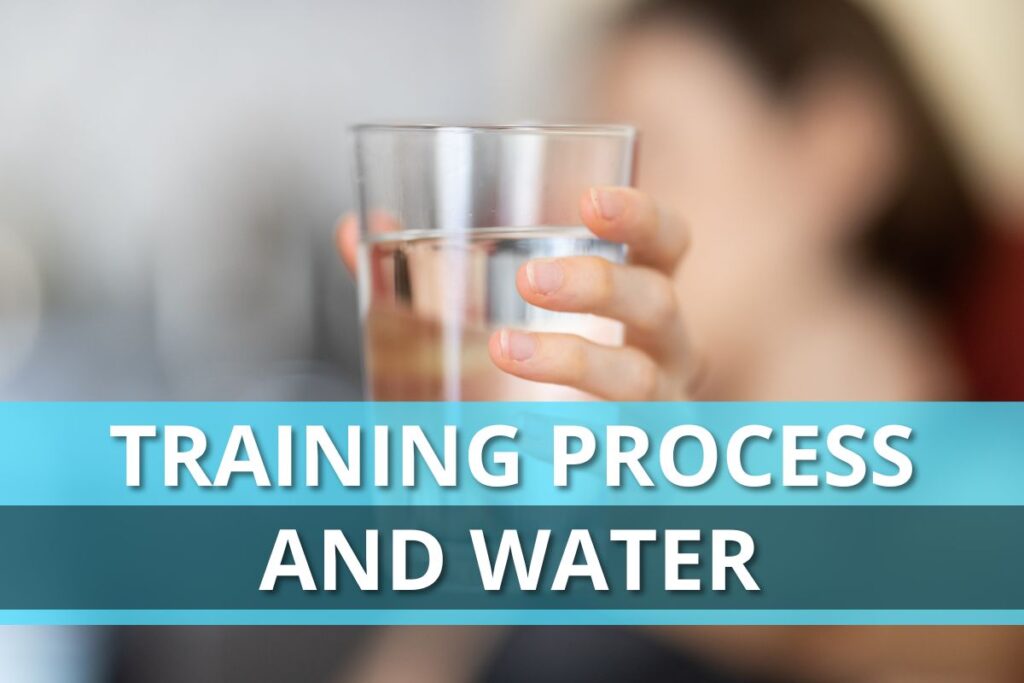Training Process And Water
Author:
Unlock your full potential by engaging with our experts and community! Have questions about your fitness journey or looking for expert advice on weightlifting techniques? Don’t hesitate — leave a comment below and Sergii Putsov will provide a personalized answer and insights to help you reach your goals.
Torokhtiy is reader-supported. Some links are affiliate links, and we may earn a commission at no extra cost to you. See our disclosure page for details.

To drink or not to drink? What are we drinking for? How much? When? What are the risks involved? Which approach and regimen is considered to be the most optimal for you? These are just a few of the questions you and every other serious weight coach has on their minds.
Today we’ll talk about water. To understand how much we need it, let’s take a moment to review where it goes after we drink it. About 300-350 ml (10.1-11.8 oz) are lost from our bodies when we breathe, up to 1000 ml (33.8 oz) is removed in the form of urine with another 100-200 ml (3.4-6.8 oz) lost through excretion, and about 500-2000 ml (16.9-67.6 oz) comes pouring out of us as perspiration (depending on the temperature and other factors). Along with these losses in water, we lose electrolytes (ions of sodium, potassium, magnesium, calcium, and etc.).
So what determines the volume of liquid loss:
- genetics – some people are born to sweat more, some less;
- body size – the more weight a person carries, the more urine and sweat they produce;
- training – a trained person begins to sweat much earlier and in greater volume than an untrained person will;
- environment – the higher the ambient temperature, the more active the sweating will be;
- physical load – of course, the more intensive we train, the more water we lose through sweat.
As of now there are no confirmed studies on the optimal amount of water to take in for a person under physical stress. The recommended consumption is from 30-50 ml per 1 kg of body weight (1-2 oz per 1 lb of body weight), but it should be born in mind that your body not only gets its water in liquid form, but water also enters the body from food. A balanced diet containing enough fiber, vegetables and fruits gives about 1 liter (33.8 oz) of water!
You may like it:

You feel thirsty when you lose approximately 2% of your body’s fluids. With a 4-5% loss there will be headache, irritability, a «spaced-out» feeling, and fatigue. 6-7% loss will create weakness, serious problems with thermoregulation and possible loss of consciousness. Just a 10-11% loss can lead to a coma, or death.
Please understand that a person would have to train excessively to suffer the ill effects of 10% fluid loss through sweat. Unless you are in the desert for two days without water or run an ultramarathon «in a dry mode» then sensible intervals and fluid intake will keep this from happening. Everyone has a head, and a brain inside it. Remember to use yours!
Simply put, drink when you need it, drink as you like, but don’t fall into the trap of fanaticism and feel like you have to take in 50 ml (1.7 oz) of water every fifteen minutes, or whatever the latest fad may be. Don’t believe the commercials that tell you there must be a sports drink in your hand during every training session.
Remember: water needs about 2 hours to digest and get into your system (so loading yourself up with water right before the training session and hearing that gurgling in your stomach is not the smartest decision). Physiologically, before an intensive training processes your body doesn’t need excess water, it will already produce enough water from glycogen and fat cells.
In conclusion I’ll repeat, every athlete has their own water rate! Drink, but drink responsibly! Don’t forget to take into account the liquids consumption from food, and listen to your body!
Train together – train right!
Also read:
Why Trust Us?
With over 20 years in Olympic weightlifting, strength training, nutrition coaching, and general fitness our team does its best to provide the audience with ultimate support and meet the needs and requirements of advanced athletes and professional lifters, as well as people who strive to open new opportunities and develop their physical capabilities with us.
By trusting the recommendations of our certified experts in coaching, nutrition, and sports training programming, as well as scientific consultants, and physiotherapists, we provide you with thorough, well-considered, and scientifically proven content. All the information given in the articles concerning workout programming, separate exercises, and athletic performance, in general, is based on verified data.
The product testing process is described in more detail here.
Author: Sergii Putsov
Head of Sport Science, PhD
Best Results: Snatch – 165 kg,
C&J – 200 kg
Sergii Putsov, Ph.D., is a former professional weightlifter and National team member, achieving multiple medals in the 94 kg weight category at national competitions. With a Master’s degree in “Olympic & Professional Sport Training” and a Sport Science Ph.D. from the International Olympic Academy, Greece, Sergii now leads as the Head of Sport Science. He specializes in designing training programs, writing insightful blog articles, providing live commentary at international weightlifting events, and conducting educational seminars worldwide alongside Olympic weightlifting expert Oleksiy Torokhtiy.




Still have questions after reading our article? Unlock your full potential by engaging with our experts and community! Don’t hesitate — leave a comment below and Sergii Putsov will provide a personalized answer and insights to help you reach your goals.